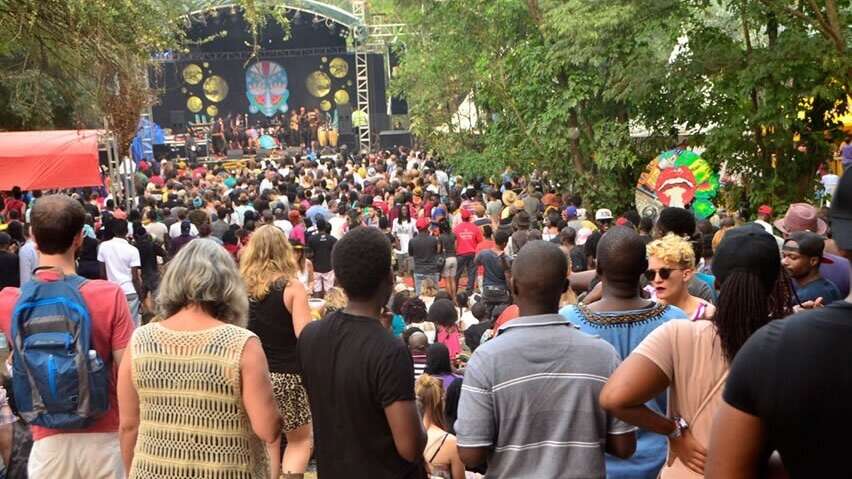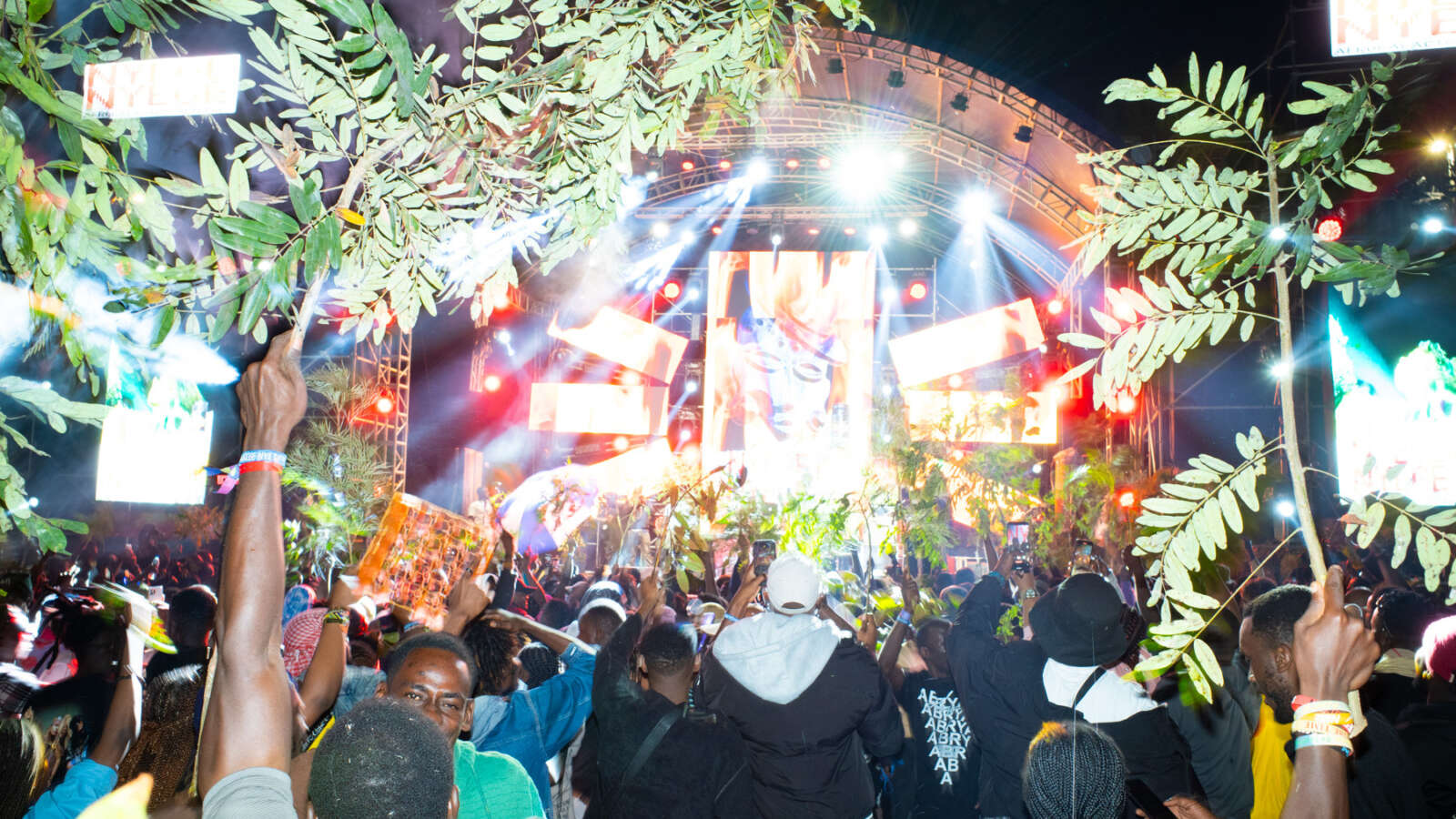Nyege Nyege 2024

An exuberant, vibrant and varied show, that challenges the preconceptions of what “world” music is, and what it can be.
Nyege Nyege this year celebrated its 9th edition on a new site in Jinja, Uganda. This was the first time for me at the event, though not my first time in Uganda, and I was excited to see how the largest music festival in East Africa would compare to my experiences of UK festivals.
Nyege Nyege has a reputation for bringing together some of the largest names in East Africa, notable musicians from wider Africa and the African diaspora, and artists who are pushing the boundaries of electronic music to its limits and challenge the perception of what ‘world’ music can and should be – and I certainly experienced all of this.
I wandered over to the site two hours after the publicised gate opening time, to find out that they weren’t going to be ready for another couple of hours, and got my first taste of one of the overriding themes of the festival – things may not go as planned, but no-one’s really bothered about it. I was invited to join a group of locals and visitors for a beer whilst we waited – another constant of the weekend being how easy it was to make new festival friends. It was at this point I was introduced to some of the rules of Nyege Nyege:
“Live in the moment, take less pictures, tell your stories by mouth!”
“No leaving the venue. You’re tired and I want to go to bed? NO! We stay till 7am, then go home, shower and return.”
“If you lose your friend, then they are probably in the river. Make your peace, return to the main stage, find a new one.”
Later that day, I got on site and had my first look at the stages and layout – some of which was still being built. It was about this time that I got details of the schedule for that day and the reality began to dawn on me: this is mainly a night-time show, with the majority of the stages running from 11pm to 8am and a few bits happening during the day. Tactical discussions were held with friends, and it was decided that a little snooze in the afternoon would set us up nicely for this, so we went back to the hotel for a bit, where we met more visitors who were here for the festival.
Returning to site at 10pm, the usual plans were put in place: something to eat, a couple of drinks, and then see where the night takes us. The food options were provided by local vendors, and mainly reflected the kind of things you’d see in restaurants or street food in Uganda: Indian food and snacks, a variety of meat on sticks, and what is practically the national dish – the rolex. On to the drinks, and another significant difference between this show and my experiences at UK festivals. A shot and the local energy drink was in order to set us up for the long night ahead – so to the bar, a bit of pointing and discussion, drinks were poured, and we were given the price which was eye-watering expensive in the local context (65,000 Ugandan Shilling or about £14 – where a beer is typically 5,000 Shilling, just over a quid). Jokingly I asked “have we bought the bottle?”, and yes, it seemed we had.
By this time, the site was approaching completion, and the stages were starting to come to life. The main stage (Uganda Waragi Stage) focused mainly on musicians and PA sets, two stages (Uganda Waragi Tent, Spirit of Uganda) were set up like clubs with bars, seating and DJ booths which were heavily focused on reggae, dancehall and local ‘pop’ music, and a couple of stages for DJs (Hakuna Kulala, Dark Star) where the more esoteric and experimental electronic music was programmed.
Day one highlights. One caveat here – there’s a reasonable chance that some of these artists are incorrectly named – the actual running order and timings of the festival were somewhat flexible, so quite often I wasn’t 100% certain who I was watching…
I spent most of the day (night!) between the Hakuna Kulala (No Sleep) and Dark Star stages. Echobass x Cr33d (Uganda) gave us intense, dark and heavy trap-beats, with the MC switching fluently between English and Luganda. The set was perfectly complemented by a rowdy crowd who were much more familiar with the choruses and call-backs than me as a first-time listener. Hibotep (Somalia / Ethiopia / Uganda) played a blistering selection of crunchy basslines, thumping dubstep (the good kind), house and drum and bass, overlaid with the textures and sounds of gnawa, taarab and other Arabic influences from her homeland and travels. An impromptu stage invasion by a local collective of MCs provided a burst of energy, though they overstayed their welcome – it was the first time I’ve seen a festival director drag someone off stage – and fortunately for the rest of her set she was given space to show what she could do. Following this was Jay Mitta x Kadiliea (Tanzania). Jay’s fast singeli beats perfectly matched Kadiliea’s MCing, and she soon had the crowd jumping and moving.
Day two, and after a late finish the night before, I headed to the site on Friday around 9pm, eager to catch Gezan, who had come over from Japan. Of course, the main stage was running around two hours behind schedule, so I had time to grab some food, a smaller bottle of spirits than the night before, and catch up with people. Gezan then treated the crowd to a no-holds-barred barrage of psych-rock, punk, noise and metal which was surprisingly well received. Following this, a PA set from Cali P (Jamaica) brought roots and dancehall to the main stage; reggae’s a big deal in Uganda, and he was warmly received by the local audience. Later on, and back to the electronica – Lady Hash (Ethiopia) played a dance-inspiring mix of bassline, afro house, amapiano and drum and bass. Following her DJ Travella (Tanzania), one of the rising stars of the underground singeli sound, showed us just what can be done with a cheap laptop and a DAW – incredible creativity, beats you’ve never heard before, and sampled sounds drawn from everyday life in the city. After this, more singeli from DJ Diaki (Tanzania) whose looks (an unimposing man in a suit) contrasted with the frenetic, relentless, restless loops that floated in and out of sync to give a complex and sometimes bemusing polyrhythmic soundscape – all at 180-250bpm.
Day three, Saturday, and despite the rain, the site was significantly busier than before, with lots of locals taking advantage of day-ticket deals. The change in vibe and energy that this brought made this my favourite night of the festival, with dancing, conversations and new friends found in every corner of the site. I spent a decent amount of time at the main stage, just soaking up the atmosphere, sharing a drink with people, and chatting to them about their experience of the festival. This was soundtracked by Elijah Kitaka (Uganda) playing his big reggae and R&B hits, and Candy Bleakz (Nigeria) and her dancers bringing authentic afrobeat to a receptive audience. This was also the only night where we were treated to UK artists, with Tash LC and Jamz Supernova playing to a packed Hakuna Kulala stage. This was my earliest finish of the weekend as well, as my enthusiasm and friendliness (and the associated drinking) got the better of me and I dragged myself back to bed at 5am, breaking the Nyege Nyege rules.
Sunday night was different – the festival proper was over, but there was still the afterparty to attend at a local club. This brought some of the DJs and artists from over the weekend together for one last big push. I danced (a lot) to dancehall and amapiano with an ever enthusiastic and friendly local crowd, watched Afrorack (Uganda) play a mesmerizing electronic jazz set, saw Arsenal Mikebi (Uganda) play all the percussion at once, and swapped stories and memories of an amazing weekend.
So, what’s the overall verdict on Nyege Nyege? It seems that this year they’d made an effort to change up the show a bit – the site was smaller and easier to get around, and they’d broadened the programming to appeal to a wider audience, especially a local one. Whilst there was no shortage of the stranger and more challenging electronic music that the festival has built its reputation on, including more mainstream (in the context of Uganda) artists was welcomed by many attendees - including myself - and gave the festival a broader appeal. For someone coming from overseas, the obvious worries - logistics of getting there, safety and security, how welcome outsiders are – were unfounded. Transport and accommodation are easy to arrange, the presence of police, army and security made it feel safe, and I was warmly embraced (often literally!) by locals both at the festival and in Jinja.
I’ll be returning next year, will be telling my stories (by mouth!) to anyone who will listen, and strongly encourage anyone who wants a bit more of an adventurous festival experience to consider it in the future.
Acknowledgements - thanks to Etania (https://www.instagram.com/forever__etania/) for the Nyege Nyege rules, Alec (https://www.instagram.com/alec_lomami/) for the photo of Hibotep fully in her power, the festival organisers and promoters for making sure we had everything we needed, and to the global members of our little Home on the Nile crew for providing non-stop chaotic energy and keeping the party going right to the finish.





